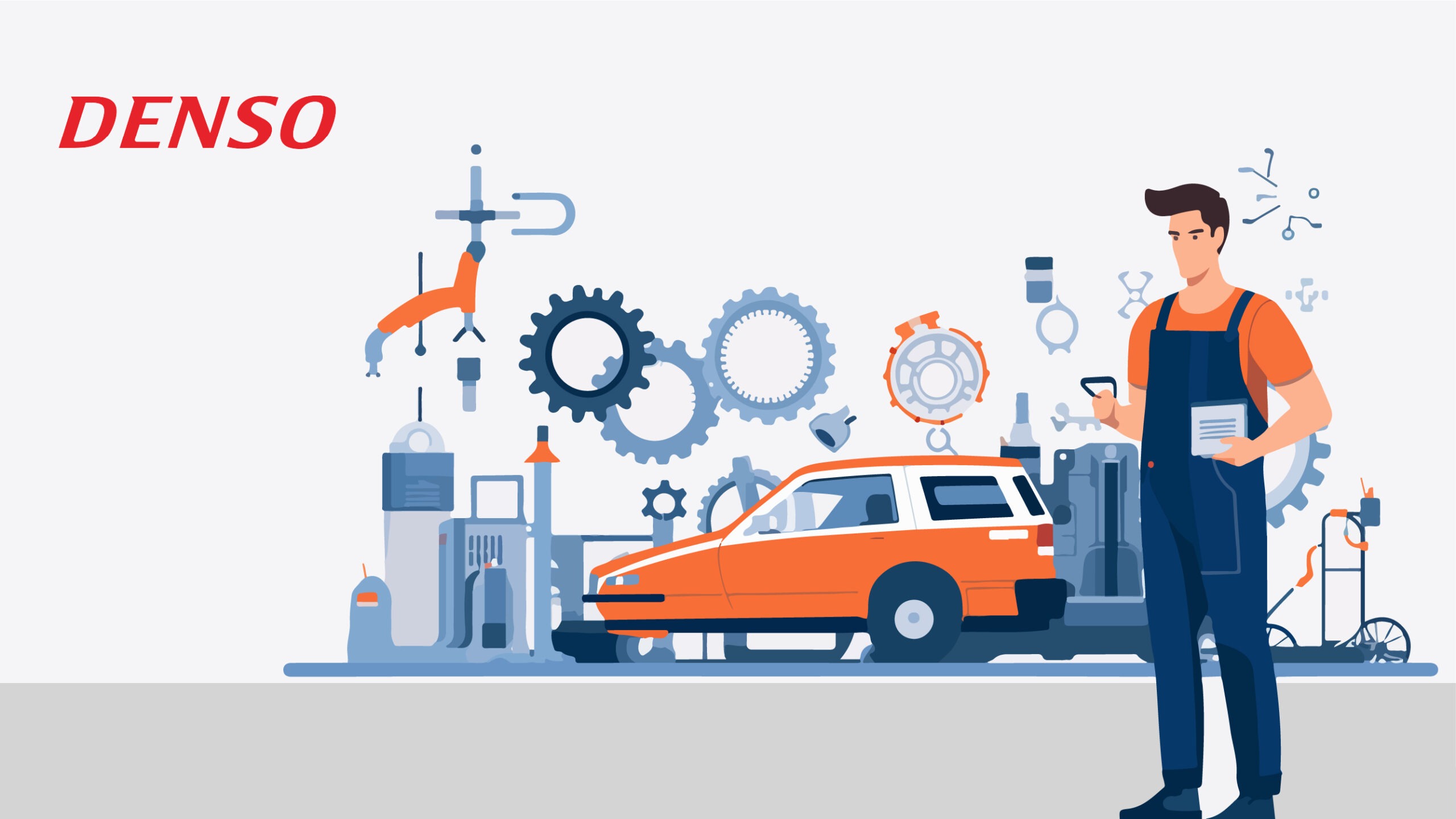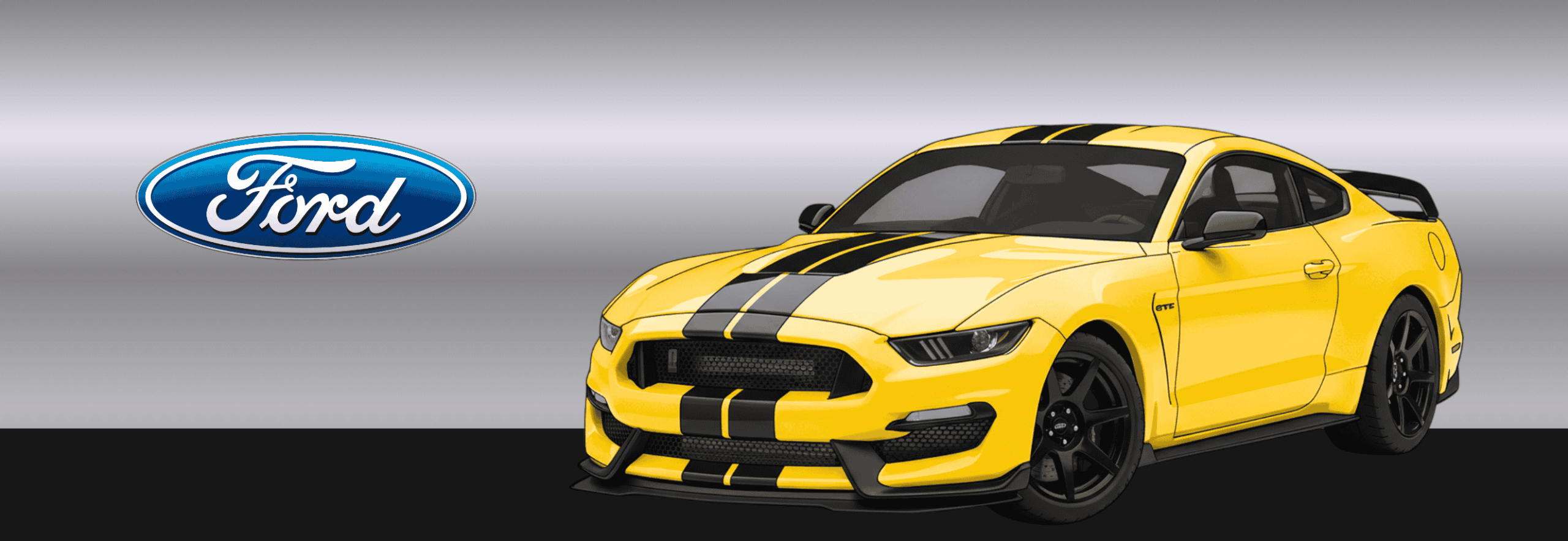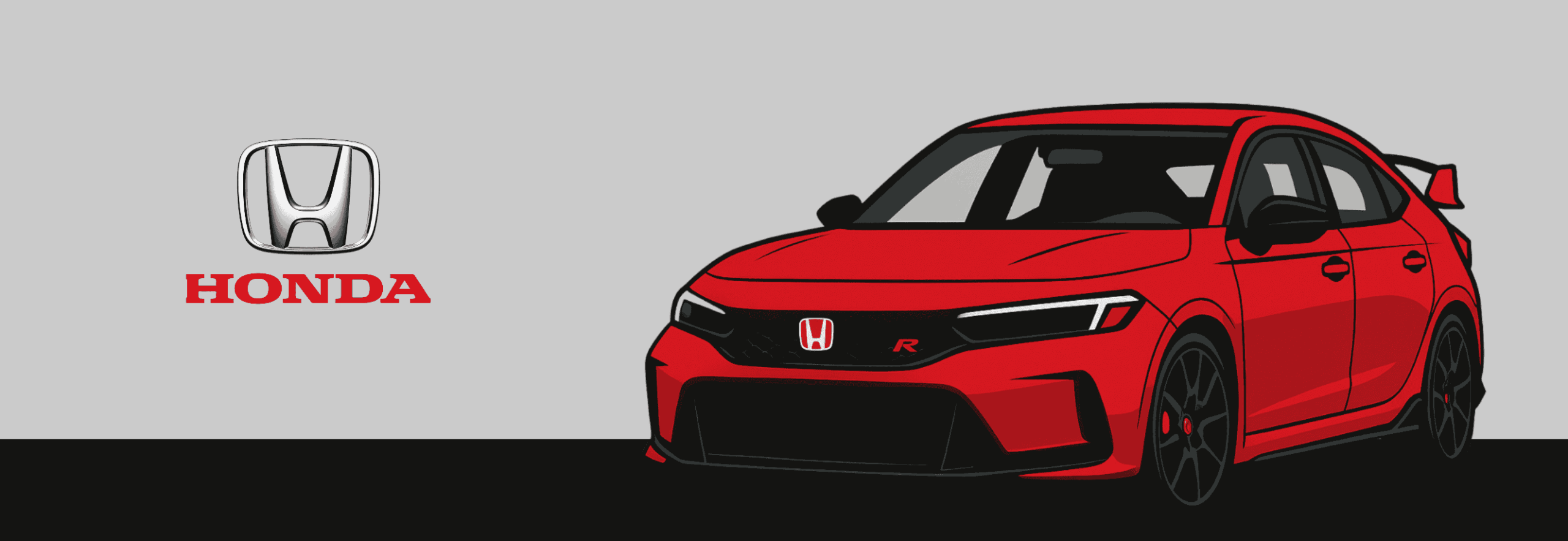Company Overview
Denso Corporation Statistics: Denso Corporation is an automotive components manufacturer providing advanced technologies, systems, and products. The company operates in 5 segments: Electrification Systems, Thermal Systems, Mobility Electronics, Advanced Devices, and Powertrain Systems.
The Electrification Systems segment develops and manufactures components for power supply systems, electric vehicles that control batteries, and other products. The Powertrain Systems Business manufactures and develops ignition, air exhaust and intake, valve train, and other products for internal combustion engine vehicles, such as diesel cars or gasoline. The Thermal Systems Business is recognized as a leader in in-vehicle air conditioning solutions such as condensers, radiators, and other cooling products.
The Mobility Electronics Business, dedicated to enhancing road safety through advanced sensors and radar-based systems, and the Advanced Devices Business focus on providing semiconductors, in-vehicle sensors, and other key components integrated into inverters and electronic control units (ECUs) used across modern vehicles.
Denso Corporation maintains a strong global presence with sales, services, and manufacturing sites spread across North America, South America, Europe, Asia/Oceania, and Africa. The company, ranked as the world’s No. 2 supplier, delivers trusted products and systems to leading car manufacturers worldwide. The DENSO Group encompasses 193 group companies, including research labs, production facilities, and sales offices worldwide. Of these, 193 are consolidated subsidiaries, distributed as follows: Japan 57, North America 23, Europe 36, Asia 29, and Others 4. DENSO operates 127 production bases across 25 countries worldwide.
The company has issued 2,910,902,118 shares, excluding 240,877,686 treasury shares. As of March 2024, Denso held approximately 39,000 patents, with an additional 3,600 patents pending.
Facts About DENSO Corp
- Founded in December 1949 as Nippon Denso Co., Ltd., after being spun off from Toyota Motor Corporation.
- Headquartered in Kariya, Aichi Prefecture, Japan.
- Renamed to DENSO Corporation in October 1996 to emphasize its global identity.
- Operates as a leading global Tier-1 supplier of automotive components and advanced mobility systems.
- Provides products across thermal, powertrain, electrification, safety, and electronics domains.
- Part of the Toyota Group, with Toyota Motor Corporation holding a significant ownership stake.
- Employs over 160,000 people across more than 200 subsidiaries worldwide.
- Ranked among the top automotive suppliers globally and consistently listed on the Fortune Global 500.
- Focuses heavily on innovation in areas such as autonomous driving, connectivity, and electrification.
- Major supplier for numerous automakers, including Toyota, Honda, Ford, and General Motors.
- Actively investing in sustainable energy and carbon-neutral manufacturing technologies.
- Has established extensive R&D centers in Japan, North America, Europe, and Asia for advanced automotive technologies.
Evolution of DENSO Corporation
- 1949: Separated from Toyota Motor Co., Ltd. and founded NIPPONDENSO, LTD. as an independent company to pursue global expansion despite economic challenges.
- 1953: Entered into a technical cooperation agreement with Robert Bosch GmbH. Establishing a foundation for technology and production to become a comprehensive automotive parts manufacturer.
- 1954: Established the Technical Training Center to instill the philosophy that “Monozukuri is Hitozukuri” (Manufacturing is about developing people) and that engineering and technique must coexist, principles still upheld within the company today.
- 1959: Formed the DENSO Cooperative Association (now DENSO HISHOKAI) to strengthen supplier partnerships. This currently facilitates annual procurement of around ¥4.0 trillion from approximately 7,540 suppliers.
- 1966: Opened sales offices in Chicago and Los Angeles, marking DENSO’s first overseas expansion and foresight into trade liberalization and globalization.
- 1985: Established Nippondenso America, Inc. and set up the first overseas technical center, optimizing product development, production, and local supply chains.
- 1991: Founded the Fundamental Research Center (now the Advanced Research and Innovation Center) to focus on next-generation technologies across multiple domains.
- 2014: Completed a network of technical centers in seven global regions, enabling rapid and competitive product development tailored to regional markets.
- 2020: Opened the Hirose Plant along with the Electrification Innovation Center (EIC), strengthening capabilities in electric vehicle development and production within the electrification domain.
- 2022: Honored with the IEEE Corporate Innovation Award for the creation and worldwide proliferation of the QR Code, recognizing DENSO’s technological innovation and global impact.
Segmental Analysis
Electrification Systems
- Core Products – Inverters (Power control units), Motor generators, Battery ECUs, ESUs (Electricity supply units).
- Electrification Systems Revenue –
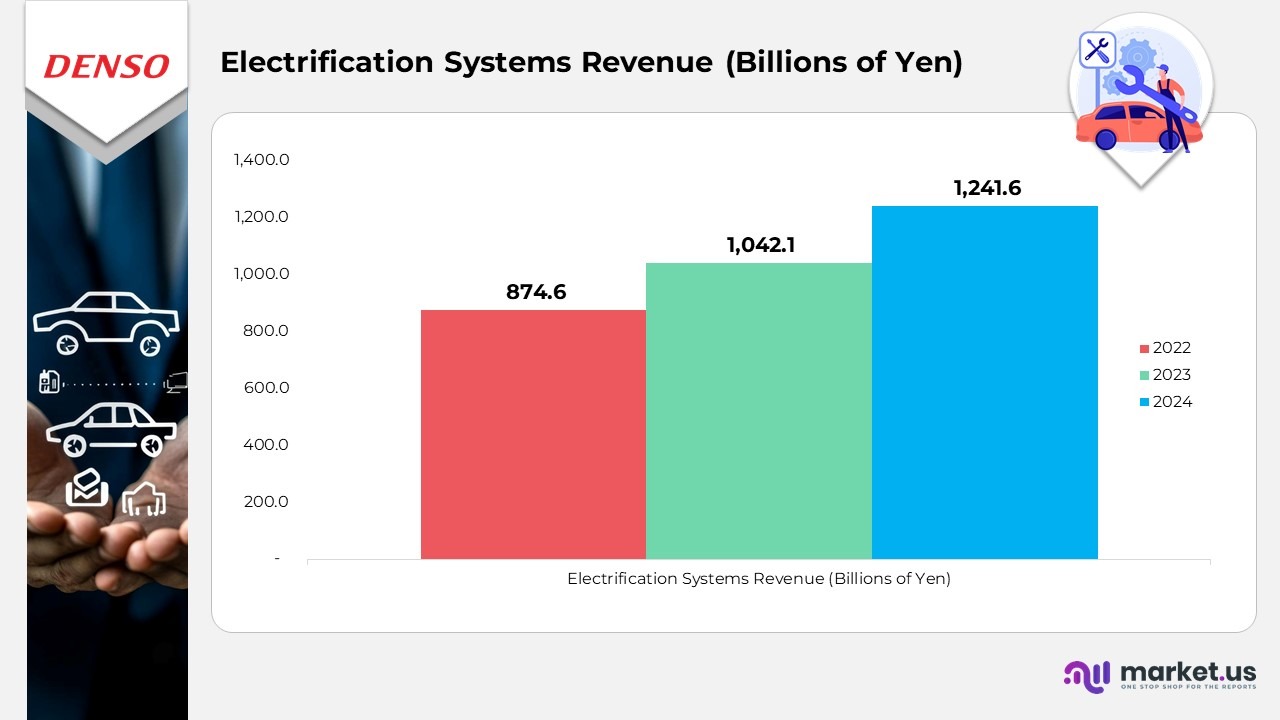
Thermal Systems
- Core Products – Heat exchangers, Air-conditioning systems for cars (passenger and commercial), Inverter cooling systems, Thermal management systems
- Thermal Systems Revenue –
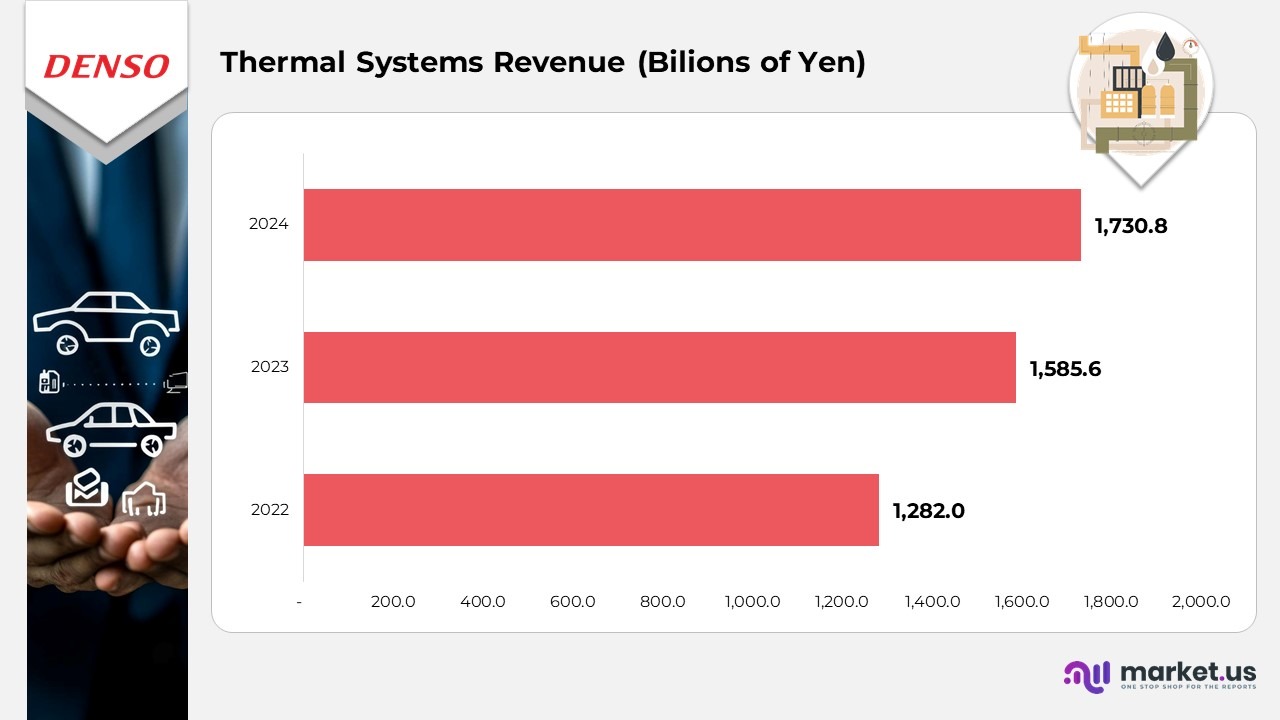
Mobility Electronics
- Core Products – Powertrain electronic control units (ECUs), Advanced driver assistance systems (ADAS), Integrated human–machine interface (HMI) systems, and Software
- Mobility Electronics Revenue –
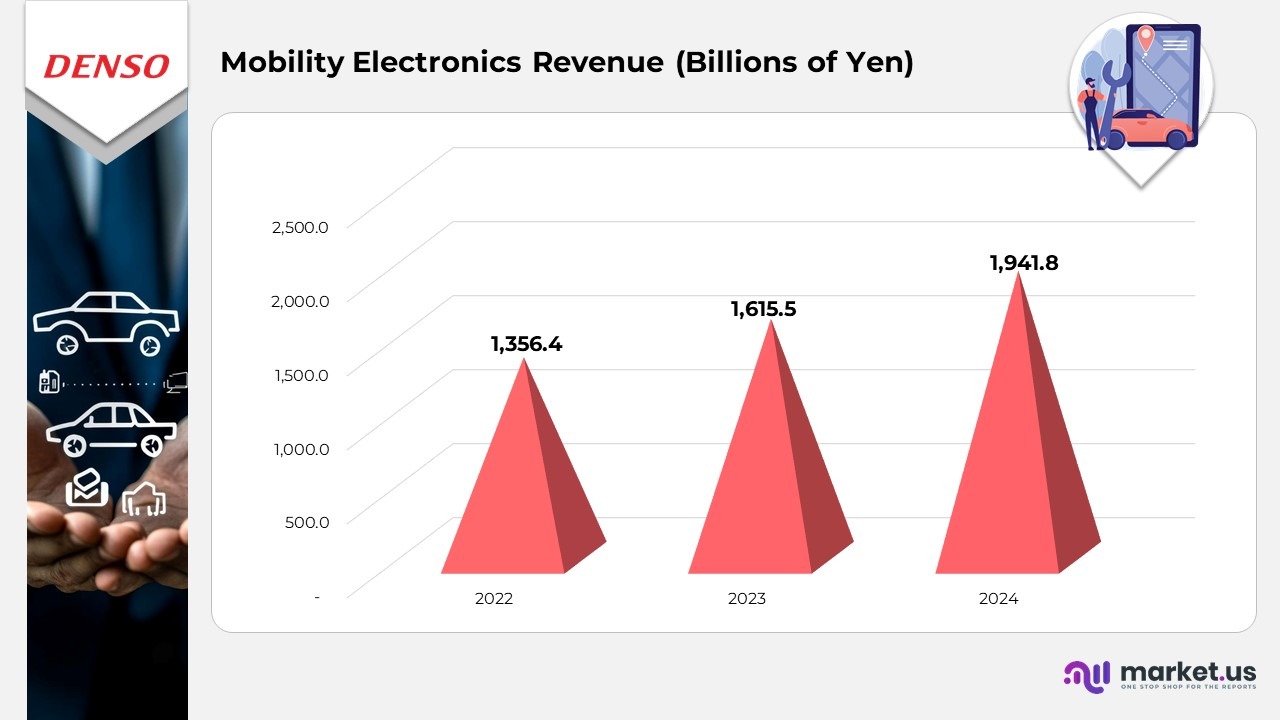
Advanced Devices
Core Products – HEAT-PRO (Highly efficient thermal management valves for BEVs), Electrical current sensors, Power semiconductors, Application-specific integrated circuits (ASICs)
- Advanced Devices Revenue –
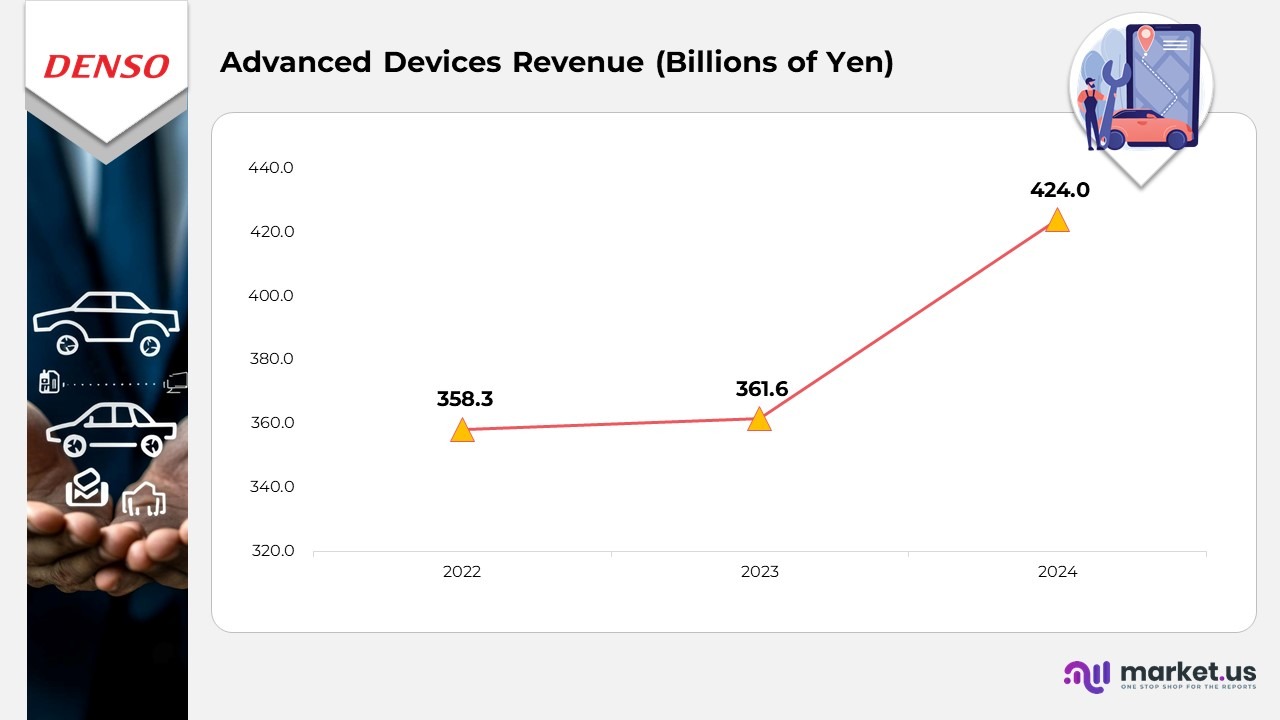
Powertrain Systems
- Core Products – Common rail systems and gasoline direct injectors, Ignition coils and spark plugs, Exhaust and cam timing systems, and Starters and alternators.
- Powertrain Systems Revenue –
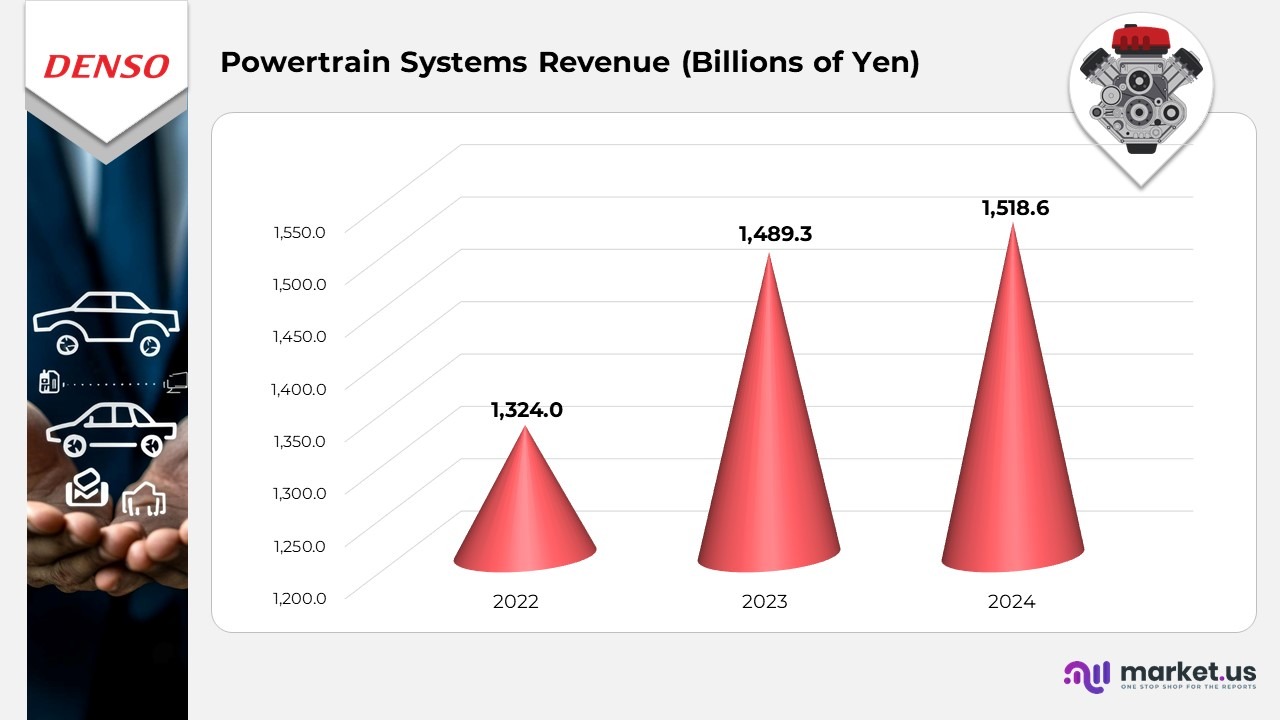
Denso Corporation Financial Analysis
Group Revenues
- In 2024, DENSO achieved a record revenue of ¥7,144.7 billion, marking a 6% year-on-year increase. This growth was driven by strong vehicle sales in Japan and North America following the semiconductor supply recovery, supported by yen depreciation and rising demand in key areas such as electrification and safety technologies.
- In 2024, operating profit stood at ¥380.6 billion, reflecting a 7% decline primarily due to the allocation of ¥201.5 billion to resolve quality-related concerns, particularly those involving fuel pumps.
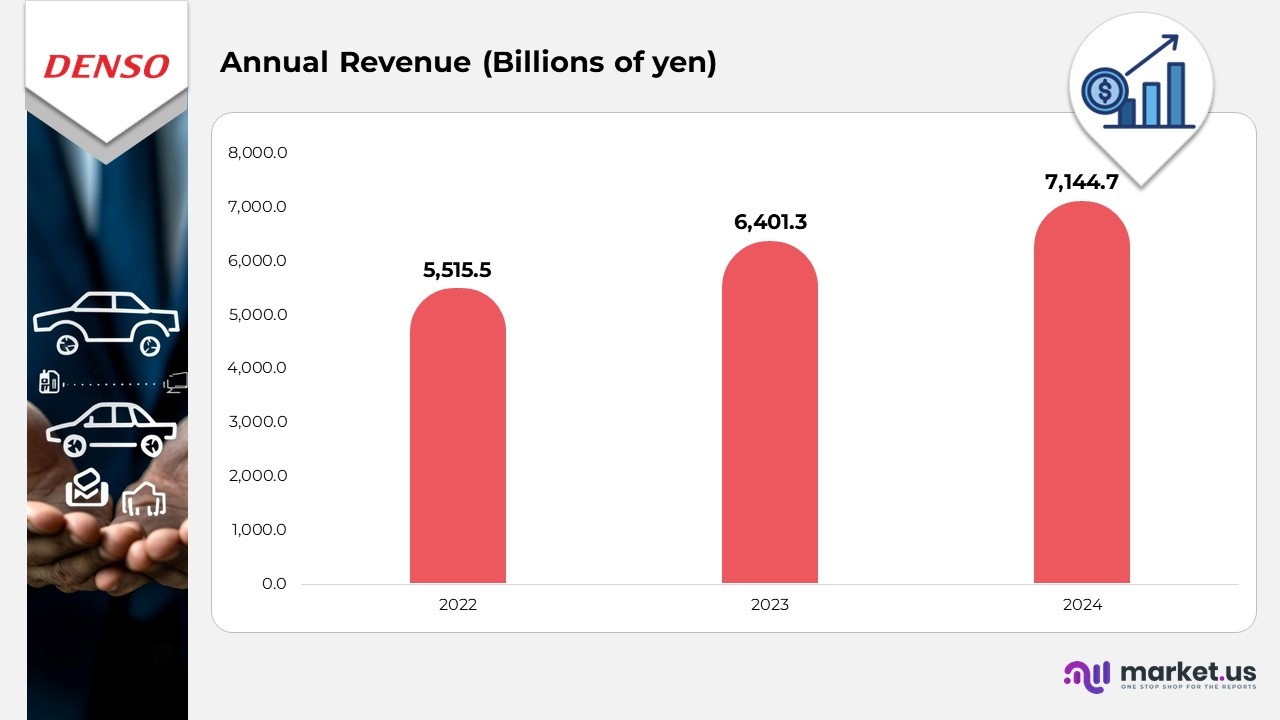
R&D Expenditure
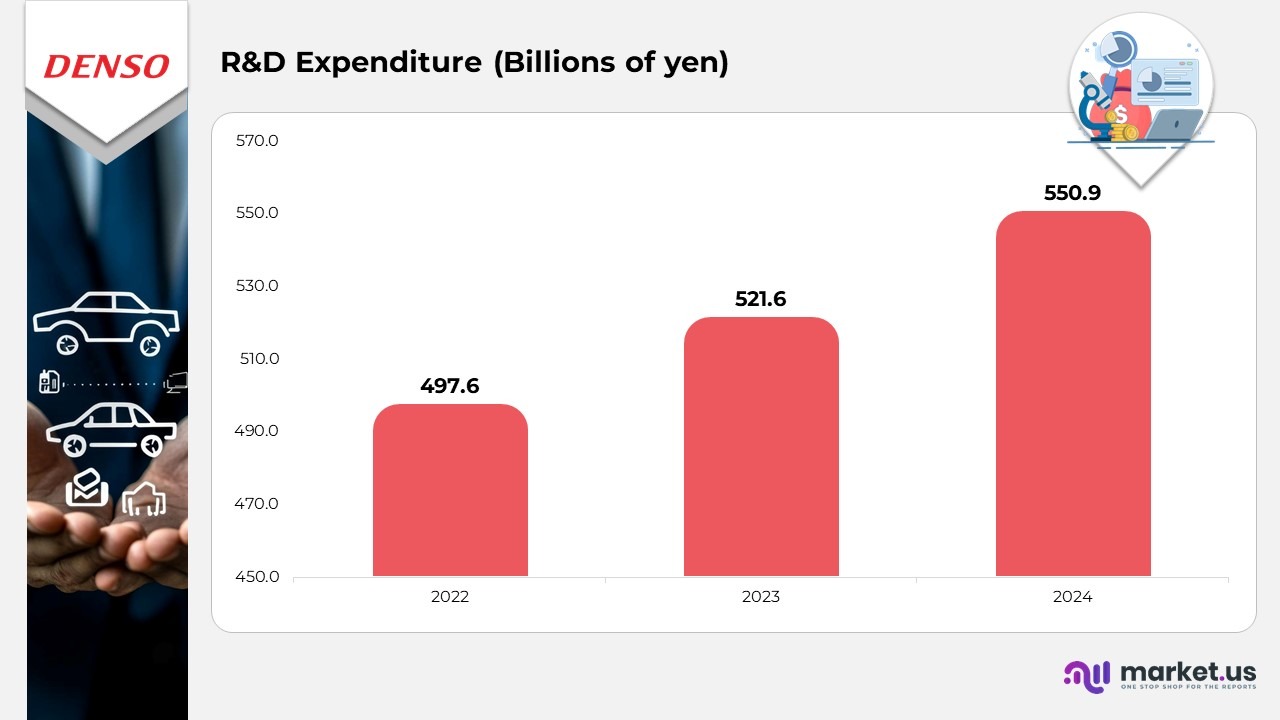
Business Revenue
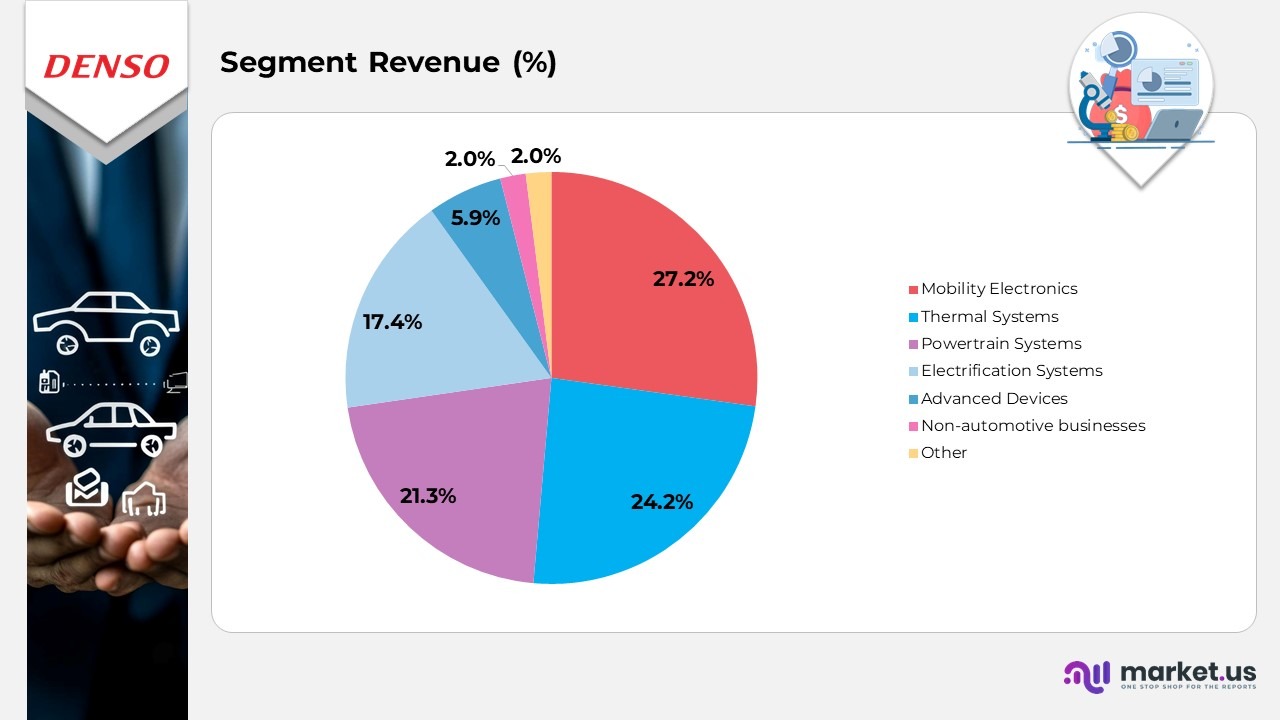
Geographic Revenue
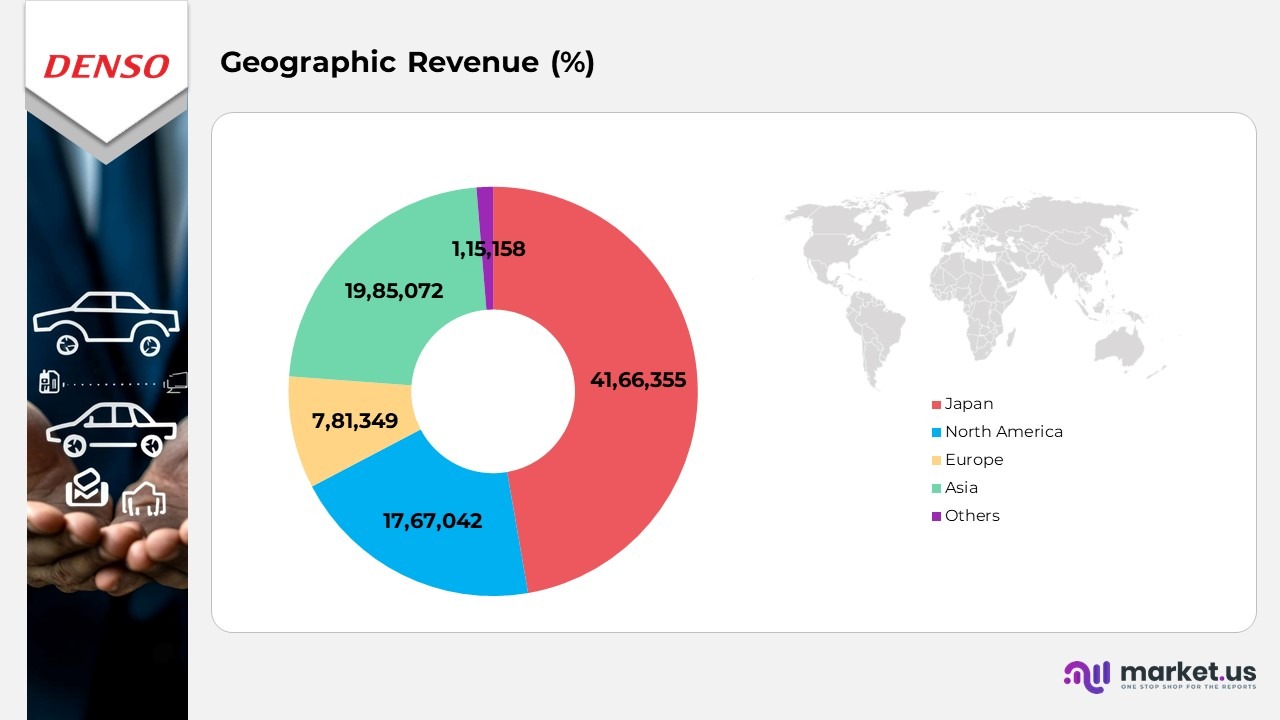
Recent Developments
- In August 2025, DENSO launched the Digital Platform Development for Mobility Circular Economy and Integrated Manufacturing for India, in collaboration with the Open API Network of India and Japan. This initiative aims to enhance the efficiency of the manufacturing sector’s supply chain, strengthen value chain connectivity, and improve user convenience across India’s automotive aftermarket.
- In September 2025, DENSO entered into a partnership with TÜV Rheinland to advance sustainable manufacturing practices for industrial products, including batteries. The collaboration will promote the use of the Digital Product Passport (DPP). Supporting transparency and sustainability across the production lifecycle.
- In July 2025, DENSO expanded its agritech portfolio by acquiring Axia Vegetable Seeds, a leading global breeder of high-quality greenhouse tomato seeds, strengthening its role in sustainable agricultural solutions.
- In May 2025, DENSO collaborated with Toyota Motor Corporation, AISIN Corporation, Woven by Toyota, Inc., and Toyota Tsusho Corporation to establish the Toyota Software Academy, focused on cultivating AI-driven and software-oriented talent to advance next-generation mobility technologies.
- In May 2025, DENSO also formed a strategic alliance with ROHM Co., Ltd. in the semiconductor sector. The partnership aims to enhance the range of high-performance analogue ICs, bolster vehicle electrification and intelligence, and strengthen joint R&D initiatives.
Moreover
- In April 2025, DENSO signed a cooperation agreement with DELPHY GROEP to develop data-driven smart horticulture solutions, integrating advanced analytics and automation to improve agricultural productivity.
- In March 2025, DENSO received EcoPass certification from Catena-X, marking a significant step in promoting environmentally responsible manufacturing and transparent supply chain management.
- In December 2024, DENSO collaborated with onsemi to enhance the procurement and integration of technologies supporting autonomous driving (AD) and advanced driver assistance systems (ADAS), reinforcing its leadership in intelligent mobility.
- In October 2024, DENSO agreed with Quadric Inc. to acquire the IP core license for the company’s Chimera GPNPU. The two firms will co-develop neural processing unit (NPU) technology for in-vehicle semiconductors, enhancing computational efficiency for future vehicles.
- In August 2024, DENSO signed an agreement with the UK-based Ceres Power Holdings for the joint development of solid oxide electrolyzer cell (SOEC) stacks, advancing its efforts toward hydrogen production and clean energy technologies.
- In June 2024, DENSO partnered with NTT DATA Japan Corporation to deepen collaboration on strategic development, talent management, and technological innovation, contributing to the advancement of Japan’s automotive industry and addressing broader societal challenges through digital transformation.
(Source: Denso Corporation Press Releases)
Fun Facts About DENSO Corp
- Invented the QR Code in 1994 through its subsidiary DENSO Wave, revolutionizing global data sharing.
- The QR Code was initially created to track automotive parts efficiently in manufacturing plants.
- Despite being part of the Toyota Group, less than half of DENSO’s sales come from Toyota, showing its diversified client base.
- DENSO produces advanced car air-conditioning systems used by multiple vehicle brands worldwide.
- The company manufactures industrial robots and factory automation systems beyond automotive parts.
- DENSO has been involved in developing next-generation EV components such as e-axles and SiC inverters.
- The company’s motto, “Crafting the Core,” reflects its mission to build foundational technologies for mobility.
- DENSO is also deeply engaged in motorsport technology, supplying parts for hybrid and electric racing vehicles.
- Actively developing artificial intelligence-based predictive maintenance systems for vehicles.
- DENSO is recognized for its strong environmental and social responsibility programs, emphasizing clean manufacturing and community engagement.


